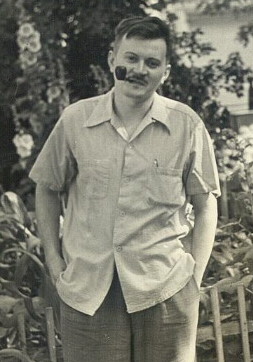A short biography for John George Reitci
(better known as Jack Ritchie)
 Jack Ritchie was born in a room behind his father’s
tailor shop in Milwaukee, Wisconsin on February 26th, 1922. After leaving high
school, Ritchie was a student at the Milwaukee State Teachers College. When America joined
the Second World War, he enlisted in the U.S army. He was stationed in the Central Pacific
for two years, serving for much of that period on the island of Kwajalein. It was here
that he first discovered crime and mystery fiction. To pass the time, he read a large
amount of mystery books and it was through this that he grew to love the genre.
Jack Ritchie was born in a room behind his father’s
tailor shop in Milwaukee, Wisconsin on February 26th, 1922. After leaving high
school, Ritchie was a student at the Milwaukee State Teachers College. When America joined
the Second World War, he enlisted in the U.S army. He was stationed in the Central Pacific
for two years, serving for much of that period on the island of Kwajalein. It was here
that he first discovered crime and mystery fiction. To pass the time, he read a large
amount of mystery books and it was through this that he grew to love the genre.
At the end of the war, Ritchie returned to his hometown of Milwaukee. After trying unsuccessfully to go back to college under the G.I. Bill, Ritchie worked for a time in his father’s shop. Not wishing to follow in his father’s footsteps, Ritchie decided to try writing stories for a living. When Ritchie met the literary agent Larry Sternig (through his mother, Irma Reitci, who also wrote short stories) he gave him a copy of a story he had written. Sternig recognised his writing ability from the very beginning and sold Ritchie’s first story, "Always the Season", to the New York Daily News in 1953. Larry Sternig went on to be his lifelong agent.
Ritchie married a fellow writer, Rita Krohne, in 1954. Rita, under her married name, wrote a series of historical adventure novels for children. Among these was the award-winning "Night Coach to Paris". Jack and Rita Ritchie made their living from the combined income of their freelance writing, though in an interview in 1962, Jack Ritchie mentioned that they never collaborated on any of their stories. Ritchie and his wife lived in various Milwaukee locales throughout the 1950's. Their first home together was a secluded log cabin on Washington Island, where during the winter they battled against the elements. With the birth of their first child in 1957, the Ritchies relocated to a larger house on the island. In 1964, they moved back to the mainland, living in a farmhouse just west of Jefferson and raising a family of four children.
In his spare time, Ritchie was an avid reader of non-fiction books and had a particular interest in history. He was also a fan of word puzzles and did the crossword in the Milwaukee Journal religiously. Having been a boxer during his spell at college, he continued to have an interest in that sport throughout his life. A number of his stories, including "Fighting is For Men", "Ape Man" and "Kid Cardula", serve to demonstrate his knowledge of boxing. It is also evident that Ritchie drew on his experience of the army when he wrote the brilliant war story "Chicken Charley". As for his influences, Ritchie stated in an interview in 1972 that he admired the writings of Agatha Christie, John D. MacDonald, Raymond Chandler and Donald E. Westlake. Mystery buffs will no doubt detect some similarities between Ritchie's work and at least some of these authors.
While his wife took part-time work to supplement the family income, Jack Ritchie, as well as being a devoted family man, continued to be a prolific writer of short stories. Ritchie’s work appeared in an amazing variety of periodicals and newspapers. He contributed a number of "hard-boiled" stories to Manhunt magazine throughout the 1950's with other stories appearing in such diverse publications as The Philadelphia Inquirer, Smashing Detective Stories and Good Housekeeping. Some readers may wonder why Ritchie's stories appeared in such a wide variety of periodicals. The major reason for this was that his agent, Larry Sternig, would promptly send out manuscripts whenever a new publication appeared on the scene. As Jack Ritchie's son Steven has noted, this is what made Sternig a great literary agent. However, it was to Alfred Hitchock's Mystery Magazine that Ritchie sold more stories to than any other periodical. Between 1959 and 1982, Ritchie sold an incredible 123 stories to Alfred Hitchcock’s Mystery Magazine. One of these tales, "The Green Heart", was adapted into the movie "A New Leaf" starring Walter Matthau. Other stories from AHMM were used in the popular television series Alfred Hitchcock Presents.
In the early 1970's, Ritchie created his two much-loved series characters, the vampire-sleuth Cardula and Detective Henry Turnbuckle, both of whom went on to feature in some of Ritchie's best known stories. More television adaptations followed, with several stories serving as the basis for episodes of the show Tales of the Unexpected. Near the end of the decade, Ritchie moved to Fort Atkinson after he and his wife divorced in 1978. Ritchie continued to contribute stories to various publications, most often to Ellery Queen’s Mystery Magazine. His short story "The Absence of Emily" won an Edgar Award in 1981 from the Mystery Writers of America, of which he was a member. Ritchie was also a lifelong member of the Council for Wisconsin Writers, from which he won three awards for his short fiction. By the early 1980s, with over 350 stories to his credit and dozens of anthology reprints, Ritchie’s reputation as a short-story writer was second to none. Shortly after completing his only novel, Tiger Island, his career was suddenly cut short in April of 1983 when he died of a heart attack at the Veterans Administration Hospital in Milwaukee. Ritchie was given a private, military funeral in Milwaukee on April 27, 1983.
As has been noted by the author Donald E. Westlake, Ritchie never really gained the recognition he deserved. This was undoubtedly because he wrote in the short story field, as opposed to the more fashionable medium of novels (Tiger Island was published posthumously in 1987). But to his many fans he is seen as one of the greatest short story writers of all time. Those that have discovered his stories invariably want to read more of them. His finest works continue to be reprinted to this day and it is through this legacy that he will be remembered.
Sources and Acknowledgements
- "Necessity of Solitude", article by Dorothy Witte Austin, The Milwaukee Journal, August 29, 1962.
- "Major Leaf in Career Turned After Reams of Stories", article by Robert W. Wells, The Milwaukee Journal, April 25, 1971.
- "Jack Ritchie: An Interview", by Ray Puechner, The Armchair Detective, October 1972.
- "Interview: Jack Ritchie (part one)", Ellery Queen's Mystery Magazine, June 17, 1981.
- "Interview: Jack Ritchie (part two)", Ellery Queen's Mystery Magazine, July 15, 1981.
- "Mystery writer Jack Ritchie dies", obituary for Jack Ritchie that appeared in The Milwaukee Journal, April 25, 1983.
- Introduction by Francis M. Nevins Jr, Little Boxes of Bewilderment, St. Martin’s Press, 1989.
- With thanks to Bob Canning and The Milwaukee Public Library.
- Special thanks to Steve Reitci for permitting me to use photographs of his father on this webpage.

Jack Ritchie circa 1980. Photo courtesy of Steve Reitci.